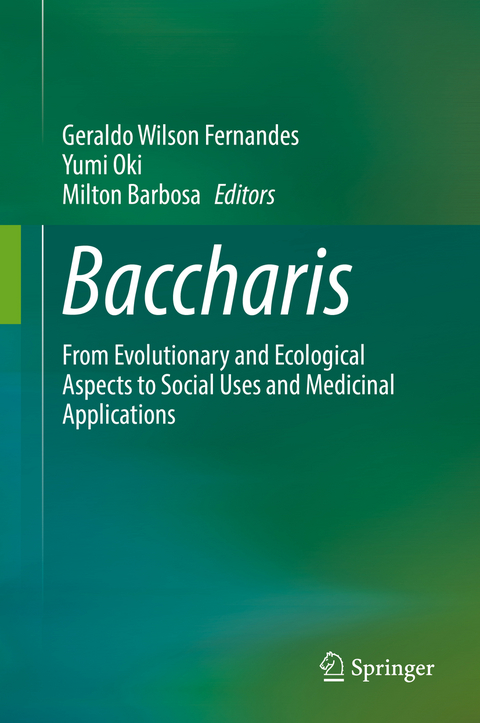
Baccharis
Springer International Publishing (Verlag)
978-3-030-83510-1 (ISBN)
lt;p>Prof Geraldo Wilson Fernandes - PhD in evolutionary ecology (Northern Arizona University, USA, 1992), Tinker Professor at Stanford University (2015/2016), visiting professor at Universidad de Seville (2019/2020), and full member of the Brazilian Academy of Sciences. Has experience in plant-animal interactions, biomonitoring, restoration ecology, climate change, environmental assessment and bioeconomy. Six books published (three of them with Springer), more than 500 peer-reviewed articles published on various subjects in the field of environmental sciences, and more than 100 graduate students supervised. Currently, full professor at the Universidade Federal de Minas Gerais, Brazil.
Dr Yumi Oki - PhD in Entomology (University of São Paulo, Brazil, 2005). Postdoctoral fellow in the Department of Earth Sciences of the University of Alberta, Canada. She has experience in the fields of Ecology, with emphasis on Ecosystem Ecology, Applied Ecology, Environmental Restoration, Environmental Services, Environmental Microbiology and bioprospecting. Current research subjects include diversity, insect-plant interaction, biological activity, Lepidoptera, herbivory, environmental services, symbiotic microorganisms and endophytic fungi. Currently, a Postdoctoral Researcher at the Universidade Federal de Minas Gerais, Brazil.Dr Milton Barbosa - PhD in Zoology (University of Oxford, UK, 2017). Worked in the Sea Around Us project, University of British Columbia, Canada. Was a Fellow in the "Emerging Leader in the Americas" program at the University of Alberta, Canada. Participated in the IBISCA (Investigating Biodiversity of Insects in Soil and Canopy) international expeditions to Australia and Vanuatu; and in the Tropi-Dry project, studying tropical dry forests in Serra do Cipó, Brazil. He is currently a postdoctoral fellow at the Universidade Federal de Minas Gerais, Brazil. He has experience in the field of Ecology, working mainly on community assembly, indirect interaction networks, and insect-plant interactions.Part I: Ecological and Evolutionary pathways.- Chapter 1: The Ecological and Applied Potential of Baccharis.- Chapter 2: Baccharis: Diversity and Distribution.- Chapter 3: The Evolution of Genetic Studies of Baccharis.- Chapter 4: Intersexual Differences in Demography, Resource Investment, and Herbivory in Baccharis.- Chapter 5: Multitrophic and Indirect Interactions in the Baccharis dracunculifolia System.- Chapter 6: Endophytic Fungi of Baccharis .- Chapter 7: Baccharis as Nurse Plants.- Chapter 8: Biological Invasion by Baccharis.- Part II: Structure and Chemistry of Baccharis.- Chapter 9: Morpho-anatomical Characteristics of Species of Baccharis.- Chapter 10: Essential Oils of Baccharis: Chemical Composition and Biological Activities.- Chapter 11: Flavonoids of Baccharis.- Chapter 12: Chemistry and Biological Activities of Phenolic Compounds from Baccharis Genus.- Chapter 13: Baccharis Terpenoid Compounds.- Chapter 14: Macrocyclic Trichothecenes of Baccharis.- Chapter 15: Livestock Intoxication by Baccharis.- Part III: Baccharis: Applications and Innovations.- Chapter 16: An Overview of the Cultural and Popular Use of Baccharis.- Chapter 17: CPQBA 1: First Cultivar Registered and Protected From a Brazilian Medicinal Plant.- Chapter 18: Perspectives of Baccharis Secondary Metabolites as Sources for New Anticancer Drug Candidates.- Chapter 19: Innovation and Knowledge of Prospective Studies on the Genus Baccharis.- Part IV: Propolis of Baccharis.- Chapter 20: Chemical Constituents and Antioxidant Properties of Green Propolis.- Chapter 21: Possible Role of Propolis-derived Components in the Prevention and Treatment of Obesity and Diabetes.- Chapter 22: Effects of the Green Propolis on the Immune Response.- Chapter 23: From Innovation to Market: an Analysis of the Propolis Production Chain.
| Erscheinungsdatum | 26.02.2022 |
|---|---|
| Zusatzinfo | XIX, 578 p. 137 illus., 79 illus. in color. |
| Verlagsort | Cham |
| Sprache | englisch |
| Maße | 155 x 235 mm |
| Gewicht | 993 g |
| Themenwelt | Naturwissenschaften ► Biologie ► Botanik |
| Schlagworte | Biological invasion • Cancer • environmental restoration • ethnobotany • herbivore insects • phytochemistry • Propolis |
| ISBN-10 | 3-030-83510-3 / 3030835103 |
| ISBN-13 | 978-3-030-83510-1 / 9783030835101 |
| Zustand | Neuware |
| Informationen gemäß Produktsicherheitsverordnung (GPSR) | |
| Haben Sie eine Frage zum Produkt? |
aus dem Bereich


